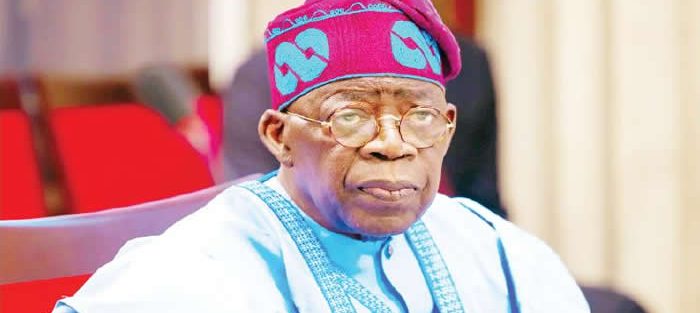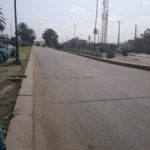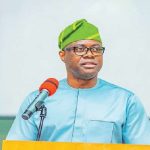
President Bola Tinubu is planning to meet with the service chiefs to discuss the rising killings in Plateau, Benue and other parts of the country on his return to Abuja from his two-week working visit to Paris, the French capital.
Tinubu returned to Abuja on Monday night after spending 18 days on a working visit and retreat in Paris and London.
The Air Force 001 aircraft conveying the President landed at the Nnamdi Azikiwe International Airport, Abuja at 09:50pm on Monday, the State House media office announced.
Since April 2, when he travelled, more than 120 locals have been killed by armed assailants.
Several homes have been burnt and 3,000 persons displaced despite the deployment of security forces.
In Benue, at least 56 people were killed in Logo and Gbagir after twin assaults blamed on armed herders.
Multiple sources said the President was concerned by the security situation and would immediately meet with the service chiefs and the National Security Adviser, Nuhu Ribadu, over the development.
On Monday, a top functionary privy to the development confirmed to The PUNCH that the security meeting would review the rising violence and the measures to contain it.
“The President will certainly meet the service chiefs to review the security situation across the country and the flash point of Plateau, Benue and Borno. He has been getting security briefings while away and giving directives to the security chiefs. So, he will meet his security chiefs and ministers too,’’ he affirmed.
This came as the Presidency blamed state governors for the mounting cases of killings nationwide, especially the recent incidences in Plateau, Benue and Enugu States.
It cited the governors’ poor funding of security outfits in their states despite receiving humongous security votes.
Special Adviser to the President on Policy Communication, Daniel Bwala, stated this when he appeared on TVC’s Beyond the Headlines show with Nifemi Oguntoye Monday evening.
Bwala said, “What we are finding, very sadly, is that there are some states where the governors give N20m to the SSS, N20m to the police, and N20m to the army as monthly allocation for fighting insecurity. And you hear their security vote is between N1bn, N2bn and N3bn. Where are we going?”
Commenting on the clamour for state police, Bwala argued the demand masks weak local governance in the states.
He maintained that the bloodshed could be curbed “within the laws and resources they (governors) already control,” if the state executives quit tokenism and fund the federal agencies in their domain.
Bwala stated, “There are people who still believe, within the present framework of the security architecture of the state, that we can deal with insecurity if we understand what it takes to do that.
“What does it take to do that? In every state, for example, there are the SSS, police, military, and paramilitary. Then, every state has the right to create a quasi-paramilitary outfit and get the support of the government to deal with legal issues.
“For example, a governor who gets more than N2bn to N3bn as security vote can decide to take only N1bn to buy equipment such as drones, vehicles and everything that is needed to do surveillance and fight security.
“That governor can give adequate infrastructure to help federal agents in their states…because crime in Nigeria is so dynamic; we’re hearing that the criminal elements even use drones. How can undemocratic elements use a sophisticated system of surveillance that the state does not have?”
Bwala insisted that the present security framework—police, DSS, military detachments and locally‑created vigilantes—can work if governors deploy their funds transparently.
“Within the framework of what we have now, governors can deploy this security vote in its proper context. Take, for example, you go to every local government and create a local government vigilante. Go to the wards. Just the same way in politics, we have the polling unit, the ward, and the local government.
“If you create that kind of system of vigilance and vanguard, some of the people might be there to provide intelligence. Some will be there to make sure that they serve at the front line in dealing with these insurgents, believe me, we will achieve substantially.
“But we have always fed this lame excuse where governors will say, ‘I don’t have the capacity to do anything because I’m not the Chief Security Officer of my state,’” he argued.
The presidential aide warned that governors who struggle to pay salaries cannot sustain an entirely new police force.
“By the time you create a state police now, a governor who says he’s struggling to pay salaries, you want to create another police system for him to pay them or to work with them free of charge?
“Do you know what it means for a state to run a security outfit like a police system. It is no joke. Do we have the budget at the moment to sustain that?
“Now, I’m not suggesting that we don’t need it. But what I’m saying is we don’t have to wait for it before we can safeguard the lives and the Meanwhile, the call by a former Chief of Army Staff, Theophilus Danjuma, on Nigerians to defend themselves against armed attackers has divided northern states.
While the Jigawa State Governor, Umar Namadi, opposed the advice, which he said could worsen the security situation, stakeholders in Plateau and Taraba endorsed self-defence as a way to curb attacks.
Speaking at a public function in his hometown, Takum, Taraba State, Danjuma reiterated a warning he gave five years ago, arguing that relying solely on government security forces is no longer realistic.
“The warning I gave years ago remains valid. Nigerians must rise and defend themselves before these bandits overrun the entire country,” he said.
However, Governor Namadi argued that insecurity in Nigeria has not gotten to the point where citizens should take matters into their own hands.
In an interview on Channels Television’s Sunrise Daily on Monday, Namadi asserted that asking citizens to defend themselves against bandits would lead to anarchy and worsen the situation.
“He (Danjuma) is a very serious security person, but I think citizens being allowed to defend themselves will cause anarchy. The issue is, the government is doing its best in the security architecture and security arrangement,” he claimed.
The governor pointed to his experience handling the farmer-herder conflict in Jigawa State, where he engaged in dialogue rather than encouraging self-defence.
“This approach has led to peaceful coexistence between the parties,” he said. If we allowed the people to defend themselves, that means you’re causing a crisis between farmers and herders.
“But when we came in, we deployed a lot of strategies, including dialogue, and tried as much as possible to engage traditional rulers and stakeholders,” Namadi explained.
Toeing the same line, the Nasarawa State Government said following its numerous efforts to adequately protect the lives and properties of the residents across the 13 Local Government Areas of the state, the people have no reason to take up arms for self-defence.
The Senior Special Assistant to the governor on Public Affairs, Peter Ahemba, noted that Governor Abdullahi Sule has been tackling insecurity in collaboration with the security agencies since he was elected into office, arguing that the self-defence argument was pointless.
He urged the residents to report all conflicts and disagreements to the security agencies.
“For us in Nasarawa State, I can say that we are lucky that we have a man at the helm of affairs as Governor, Engr Abdullahi Sule, who has prioritised the security of lives and properties in the state.
“The state government has invested so much in security, which is why the state is relatively peaceful. That call may be applicable in other places, but for us in Nasarawa State, such a call is not welcome.
“So, therefore, the residents of Nasarawa State have no reason to resort to self-defence since the state government under the leadership of Engr Abdullahi Sule is already living up to its responsibility of protecting their lives and properties,” he added.





